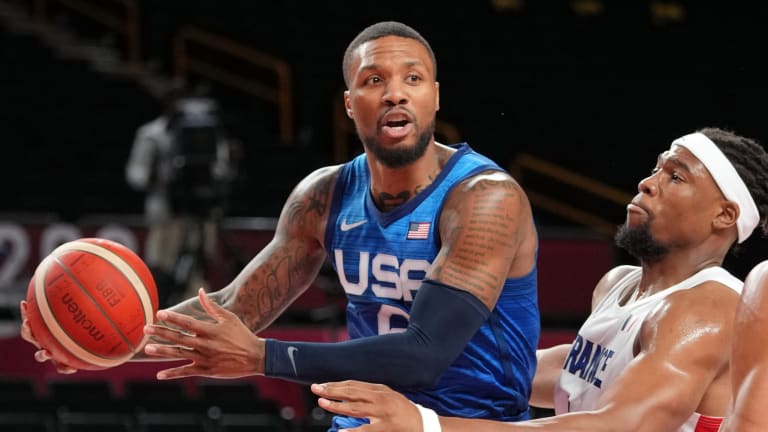
Damian Lillard Was 'Completely Different' Playing for His Country, Too
Damian Lillard pinpointed at least one thing that so many frustrated and flabbergasted American fans were thinking after Team USA's dispiriting loss to France in its Olympic opener.
Evan Fournier dropped a game-high 28 points for the French, embracing his inner alpha dog to lead his team to comeback victory. Needless to say, Fournier's status as France's primary offensive option is a far cry from the tertiary role for which he's best suited in the NBA—a dynamic that Lillard suggested took Team USA somewhat by surprise.
"These guys, it means a lot to [them], like it means a lot to us," he said after the Americans' 83-76 loss."And you know who we see each night sometimes in the NBA, they are completely different when they play for their countries. They got more freedom, and the comfort level is obvious."
There's a lot Team USA can do to improve in wake of its first Olympic loss since 2004.
The Americans, who tipped off training camp in Las Vegas less than three weeks ago, continue to preach the importance of their growing cohesion. Just like spending additional time on the court together will benefit Team USA from standpoints of chemistry and connectedness, that experience will help the Americans grow more accustomed to the different rules, overt physicality and cramped floor of the international game, too.
The adjustment that makes NBA role players like Fournier superstars while donning their country's colors has a diminishing effect on Team USA. There's only one ball to go around, after all, and past iterations of the national team reserved multiple roster spots for specialists who better balanced the Americans' roster. Not this time, with the selection and preparation process marred by ripples of COVID-19.
Is it any surprise that a team full of stars whose NBA identities are marked by racking up points and dominating the ball are laboring while being shoehorned into an egalitarian offensive ethos?
Team USA isn't playing much like the San Antonio Spurs offensively, but don't tell that to the players, who The Athletic's Joe Vardon reports are irked by the offensive approach implemented by Popovich.
The players are frustrated, too, grumbling on their way back to the locker room about “running the San Antonio offense” when apparently they feel like there are better ideas.
Before Team USA lost its initial pair of exhibitions, Lillard described the role he expected to play for his country this summer. Though he and Kevin Durant wouldn't necessarily need to go off like they do with the Trail Blazers and Brooklyn Nets for the Americans to succeed, Lillard copped to both megastars emerging as Team USA's clear-cut top options offensively.
Popovich, even if he'd prefer Team USA play the beautiful game best embodied by that iconic 2014 championship team with the Spurs, was no doubt comfortable with the notion of Lillard and Durant taking those reins. Among the miscues that had to irk him most against France, though?
Lillard passing up a wide-open wing triple late in the game for a telegraphed pass to Zach LaVine that was picked off, leading to Fournier's go-ahead three on the other end.
The Americans, obviously, are still searching for an optimal medium between their roles in the NBA and those with Team USA. The pecking order Lillard described is a necessity, but so is a concerted effort to ensure the United States' whole is greater than the sum of its parts.
Foreign-born players like Fournier don't have to manage that balancing act in Japan. Their teams can't win unless they level up on the international stage, a metamorphosis they've been undergoing for years once the NBA season ends.
The good news? Lillard, a Team USA rookie, knows what he should have done to help the Americans avoid their loss to France—and seemed intent on not making his biggest mistake again.
"I had a shot I passed up, that I should have shot. I swung it—it got stolen," he said. "We let one get away. But it’s a lot of things that we could have done better, including making shots."